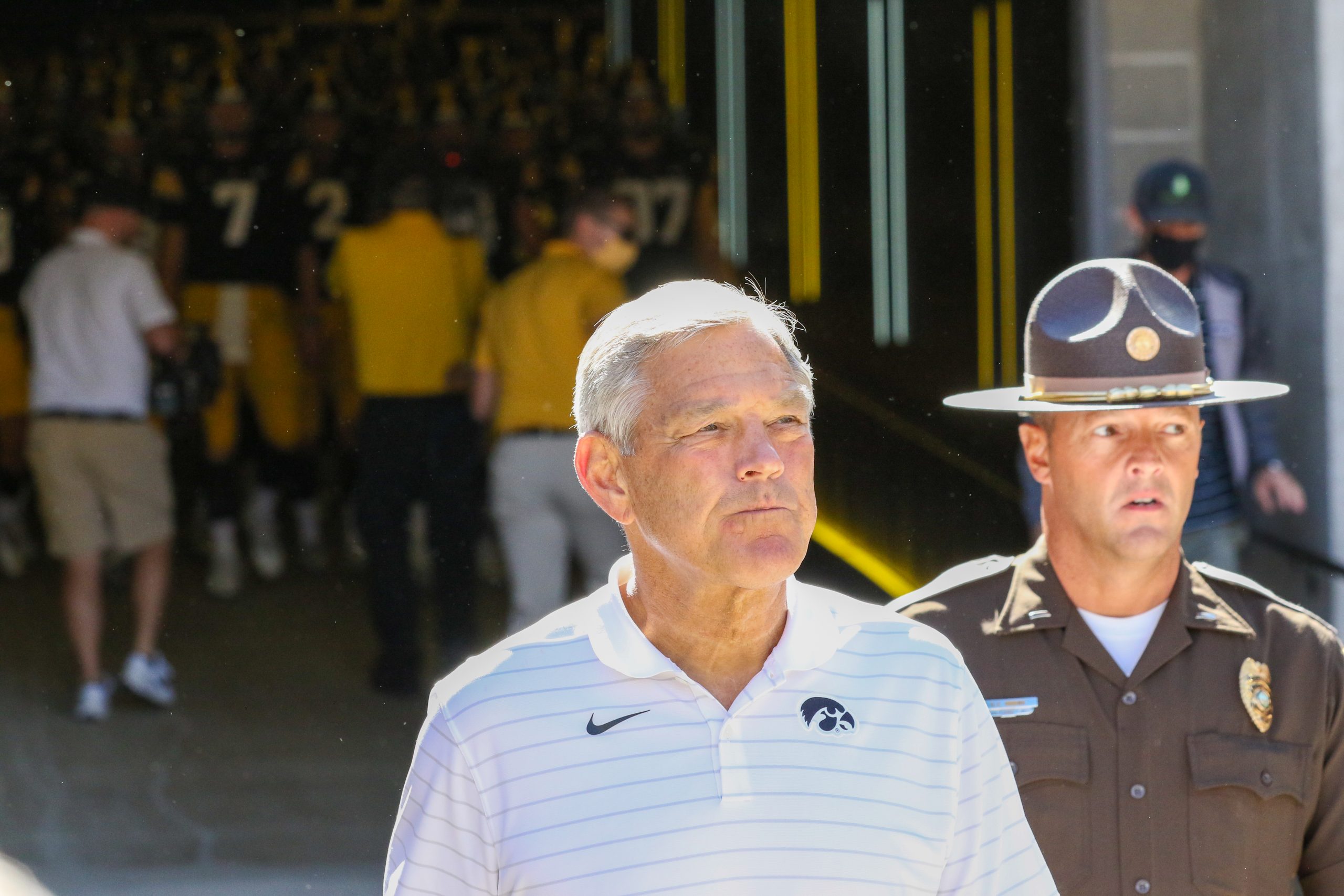Kirk Ferentz’s 20 best decisions as the Iowa head coach
By Pat Harty
IOWA CITY, Iowa – Kirk Ferentz’s decision to call out Penn State for what he believes were some questionable injuries in last Saturday’s game probably ranks among his most controversial decisions as the Iowa head coach.
So, you won’t find it on the following list of Ferentz’s 20 best decisions as the Iowa head coach.
Ferentz is in his 23rd season as the Iowa head coach, and he has made countless decisions that have impacted the program in a positive way, so many that it was hard trimming the list to 20.
Iowa is 6-0 for just the third time under the 66-year old Ferentz and ranked second in the Associated Press heading into Saturday’s homecoming game against Purdue (3-2) at Kinnick Stadium.
Some of the Ferentz’s decisions on this list are having a major impact this season.
The list is in no particular order because to rank them from one to 20 would’ve been too difficult. It was hard enough trimming the list to just 20.
- Hired Norm Parker as his first defensive coordinator: Ferentz saw how well the relationship worked between Hayden Fry and his defensive coordinator, Bill Brashier, and then built a similar working relationship with Norm Parker.
Ferentz gave Parker free reign over the defense and trusted his wisdom and ability to teach and motivate players, as Fry did with Brashier.
The approach worked in both cases as the Iowa defense excelled under both coordinators. Parker’s defenses were always fundamentally sound, aggressive, opportunistic, and well-connected. They also rarely gave up big plays.
Parker retired from coaching after the 2011 season and passed away in 2014 at the age of 72.
But his legacy with Hawkeye football will live on forever.
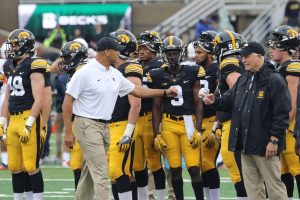
2. Hired Levar Woods as special teams coach: Woods returned to his alma mater in 2008 after having played 88 games in the NFL. He started as an administrative assistant, a job he held from 2008-11, and then became the linebackers and special teams coach.
He also coached tight ends and worked with special teams from 2015-17 before becoming the full-time special teams coordinator in 2018.
Special teams have become a strength under Woods, and that is certainly the case this season with Iowa having one of the best kicker-punter combinations in the country in senior kicker Caleb Shudak and sophomore punter Tory Taylor. Shudak has made 11-of-12 field-goal attempts, while Taylor is averaging 46.6 yards on a Big Ten leading 40 punts.
Taylor was also named the Big Ten Punter of the Year as a freshman last season.
“Huge,” Shudak said of Woods’ impact. “I think the attention to such small details whether it’s tempo, speed, strategy, whatever it is, it’s huge and it’s been vital for our success.”
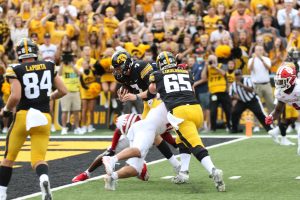
3. Moved Tyler Linderbaum from defensive tackle to center: The Solon native was recruited to play defensive tackle and played that position throughout the regular season as a true freshman in 2018.
Linderbaum switched to center during preparation for the 2019 Outback Bowl at the suggestion of the Iowa coaches, and the decision helped to change the course of his life as he now ranks as arguably the top center in college football.
Kirk Ferentz said Linderbaum performed well on defense and would’ve been a key contributor if he had stayed on that side of the ball. But Ferentz also saw something in Linderbaum that made him think center would ultimately be his best position, and Ferentz now looks like a genius in this case with Linderbaum having ascended to greatness.
4. Moved Dallas Clark from linebacker to tight end: Clark came to Iowa as a walk-on linebacker under Hayden Fry and then switched to tight end under Ferentz.
The position switch paid huge dividends as Clark would go on to become a consensus All-America tight end in 2002. He also won the John Mackey Award in 2002 as the nation’s top collegiate tight end and would go on to have a long and distinguished career in the NFL, winning a Super Bowl with the Indianapolis Colts.
Clark was one of the first position switches under Ferentz that worked out brilliantly.
5. Moved Eric Steinbach, Robert Gallery and Bruce Nelson from tight end to the offensive line: Speaking of positions switches that worked out brilliantly, here are three more. All three came to Iowa as tight ends before switching to the offensive line where all three would go on to earn All-Big Ten and All-America recognition.
They formed three-fifths of the starters on Iowa’s 2002 offensive line, with Steinbach playing guard, Gallery at left tackle and Nelson at center. Gallery won the Outland Trophy in 2003 as the nation’s top interior lineman, and he was also the second player selected in the 2004 NFL Draft.
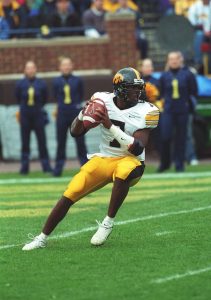
6. Recruited Brad Banks from junior college: Kirk Ferentz is very selective when recruiting junior college players, and he doesn’t do it very often.
But when he does, it usually pays off.
And in the case of Brad Banks, it paid off in a way that nobody could’ve imagined as Banks went from being the backup quarterback in 2001 to the Heisman Trophy runner-up in 2002.
Banks is one of few dual-threat quarterbacks to play for Ferentz at Iowa, and his ability to make plays with his legs was a key to Iowa’s success in 2002.
7. Offered Bob Sanders a scholarship: Iowa and Ohio were the only schools to offer Sanders a scholarship. Iowa offered largely due to Ferentz’s close friend and former high school coach, Joe Moore, who convinced Ferentz that Sanders was worth taking a chance on.
Sanders was undersized at about 5-foot-8, but he was a transcendent player and arguably the most influential player under Ferentz. He changed the tempo at Iowa while becoming one of the top defensive backs in program history.
Sanders played with the kind of violence and aggression that would’ve made it hard for him to avoid penalties in today’s game with the heightened awareness about head injuries.
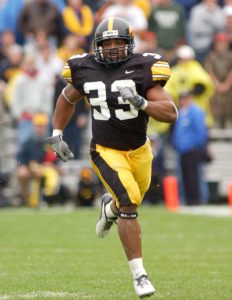
He wasn’t dirty, but he played with a reckless abandon that struck fear in opponents. His bone-jarring tackles energized his teammates and often left opponents woozy.
Sanders also achieved stardom in the NFL where he was named the Defensive Player of the Year in 2007 as a member of the Indianapolis Colts.
8. Hired Reese Morgan after the 1999 season: Morgan was building a dynasty as the head coach at Iowa City West High School when Ferentz hired him after his 1-10 debut season in 1999.
Morgan became a recruiting force and a keen judge of talent. He saw potential where other coaches didn’t, and he was widely respected in Iowa, which helped Iowa dominate instate recruiting.
He also excelled as a position coach, first with the offensive line and then with the defensive line. Morgan earned his players trust and admiration and that carried to the field where they performed well for him.
9. Promoted Phil Parker to defensive coordinator: Parker had shown promise as Iowa’s defensive backs coach and was an original member of Ferentz’s staff when he was promoted to defensive coordinator after Norm Parker retired after the 2011 season.
A former all-Big Ten safety at Michigan State in the 1980s, Parker has respect as a former star player, and he has a knack for putting his defenders in the right spots to make plays. His defenses rarely give up big plays and they’re fundamentally sound.
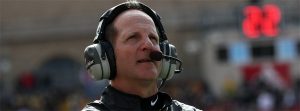
Parker probably could’ve been a head coach by now, but he also has a pretty good gig under Ferentz that now pays him $1 million annually.
Iowa currently leads the nation with 16 interceptions and leads the Big Ten and ranks fourth nationally in scoring defense (13.0.) Iowa also ranks second in the Big Ten, and ninth nationally in total defense, allowing just 274.2 yards per game.
Iowa also has played 28 straight games without surrendering 25 points.
10. Benched Jake Christensen in favor of Ricky Stanzi at quarterback after four games in 2008: The Iowa offense sputtered throughout the 2007 season with Christensen playing quarterback, and the same thing was happening in 2008 until Ferentz finally benched Christensen in favor Ricky Stanzi after four games.
Stanzi would go on to post a 26-9 record as Iowa’s starting quarterback and he threw at least one touchdown pass in 21 consecutive games. He finished his career with 7,377 passing yards and 56 touchdowns.
11. Stayed committed to Shonn Greene when he had to spend a year in junior college: Ferentz could’ve easily moved on after Greene left the program in 2006 due to academic reasons.
But Ferentz stayed committed to Greene, while Greene stayed committed to Iowa during his year in junior college.
Greene became Iowa’s featured running back in 2008 and would go on to have arguably the greatest single season ever for an Iowa running back.
He set Iowa’s single-season rushing mark with 1,850 yards and had at least 100 yards rushing in all 13 games.
Greene also led Iowa to a 9-4 record, including a victory over South Carolina in the Outback Bowl.
He skipped his senior season to enter the 2009 NFL Draft where he was selected by the New York Jets in the third round.
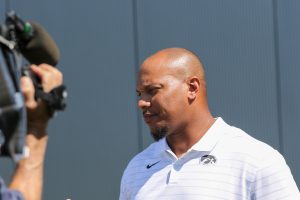
12. Hired Ladell Betts as running backs coach: Betts is only in his first season as the Iowa running backs coach, but his impact already is noticeable, especially in recruiting.
Iowa has verbal commitments from a four-star running back from Florida and from a three-star running back from Ohio in its 2022 recruiting class. Betts is largely responsible for that.
He brings instant credibility as a former NFL running back, and as Iowa’s second all-time leading rusher with 3,686 yards. Betts is also familiar with Iowa’s tradition, and with the Iowa City community.
The timing of Betts’ hire is also significant because it came just months after the racial unrest that rocked the Iowa program in the summer of 2020. His addition helped to stabilize things, and helped to connect the present with the past at Iowa.
Recruiting was a concern in the wake of the racial unrest, but Betts already has shown that he can bring talent to Iowa City from all over the country.
13. Hired Kelvin Bell as a graduate assistant in 2012: The Mississippi native was a defensive lineman at Iowa under Ferentz, but his career was cut short by injuries.
Bell’s first job in coaching was as an assistant coach for Iowa City Regina High School in 2004. He spent three seasons at Iowa Regina before coaching the offensive line at Cornell College in 2006 and 2007. He then coached for two seasons at Wayne State and for one season at Trinity International in 2011 before returning to Iowa.
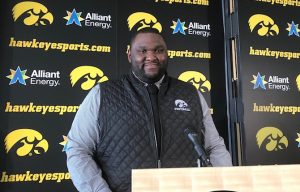
Bell was Iowa’s recruiting coordinator from 2016-19 before switching to the defensive line where he has helped develop star players such as A.J. Epenesa, Daviyon Nixon and Chauncey Golston.
Iowa has established great depth on the defensive line under Bell with as many as nine defensive linemen playing key roles.
Senior defensive end Zach VanValkenburg has also emerged as a star after playing his first three seasons at Division II Hillsdale College in his home state of Michigan.
14. Hired Neil Cornrich as his agent: Ferentz has certainly had enough sustained success to give him leverage when negotiating his contract.
But his agent, Neil Cornrich, also deserves credit because it seems that each time Ferentz has re-negotiated his contract he has had the upper-hand over Iowa, from the number of guaranteed years to the expensive buyout.
More power to Ferentz.
15. Moved practice to the morning: This was a change that Ferentz made after the 2014 season and Iowa has a 59-21 record since the start of the 2015 season. This was a pretty dramatic change with players having to adjust their schedule away from football, and their sleeping habits. But it seems to be working, considering Iowa’s success.
16. Replaced Jake Rudock with C.J. Beathard at quarterback shortly after the 2014 season: This was another change that Ferentz made shortly after the 2014 season.
Rudock had started for two consecutive seasons, and had played well at times, especially early on. But the offense became stagnant under Rudock and the losses started to mount.
There were also rumors that C.J. Beathard was seriously considering transferring unless he became the starter. Those rumors quickly vanished after Beathard was named the starter and he would go on to lead Iowa to a 12-2 record in 2015 and to the Rose Bowl, while making second-team all-Big Ten.
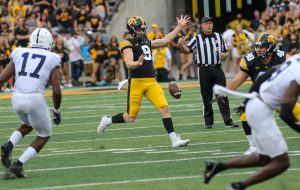
17. Had LeVar Woods travel to Australia to recruit Tory Taylor: Ferentz sometimes has been criticized for not thinking outside the box enough, or for being too stubborn or set in his ways.
But not in this case.
Ferentz saw that other teams were having success with punters from Australia, so he allowed LeVar Woods to recruit Tory Taylor, who is from Melbourne, Australia. Woods flew to Melbourne to meet with Taylor and the rest is history that’s now being made.
Taylor has arguably been Iowa’s most valuable player so far this season. His ability to shift field position, and to pin opponents deep in their own territory has been crucial to Iowa’s success.
18. Turned down Jacksonville’s offer in 2002 to stay at Iowa: Ferentz almost certainly would’ve handled the Jacksonville job with more class and dignity than Urban Meyer, but it still would’ve been a risky move trying to build a winning team in the NFL.
He has a lifetime of security at Iowa, thanks to a contract that has paid him incentive bonuses for only winning seven games in a season.
19. Allowed his players to be on Twitter: Ferentz was forced to make some changes in the wake of the racial unrest in the summer of 2020, and allowing his players to be on Twitter was one of the changes.
It was Ferentz’s way of empowering his players and allowing them to express themselves on another platform. Ferentz had been concerned that Twitter would be a distraction, and that some of his players, might say things that they ultimately would regret.
But so far, it’s gone smoothly.
20. Moved Marvin McNutt from quarterback to receiver: McNutt was given a chance to compete for the starting quarterback position. But when it became clear that he wouldn’t see much action at quarterback, he moved to receiver, and to say the switch paid dividends would be an understatement.
McNutt is Iowa’s all-time leading receiver with 2,861 yards and 28 touchdowns.
